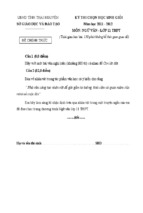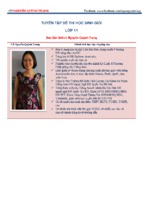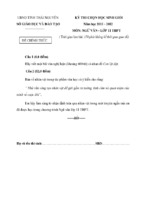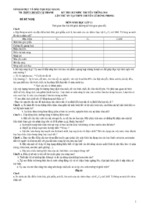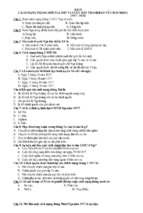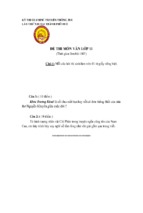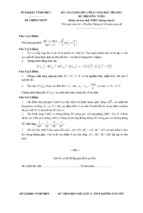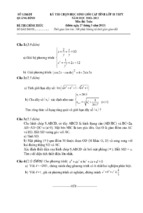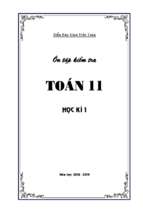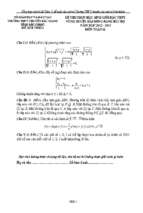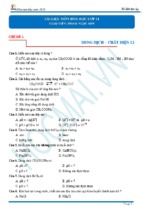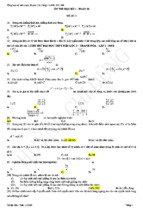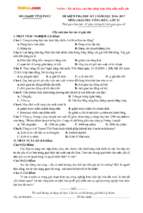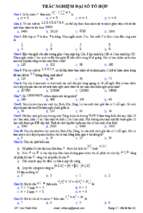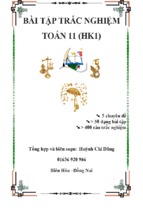SỞ GD&ĐT LÂM ĐỒNG ĐỀ THI HỌC KỲ I _ NĂM HỌC 2016-2017
TRƯỜNG THPT LỘC PHÁT
MÔN : TIẾNG ANH 11 (chương trình chuẩn)
ĐỀ CHÍNH THỨC
Thời gian : 45 phút ( không kể thời gian phát đề
)
(Học sinh làm bài trên tờ đề thi, phách rời)
Đề thi gồ m có 02 trang
Mã đề : 110
-------------------------------------------------------------------------------------------------------------------------------
PART 1: READING & WRITING
I. Circle the word with the underlined letters pronounced differently from those of the
others (0.6m)
1. A. honest B. honey C. humour D. handicapped
2. A. participated B. sacrificed C. needed D. celebrated
3. A. friends
B. solution C. volunteers D. disaster
II. Complete the sentence (0.4m)
1. John: Thank you for your help, Ann.
Ann: …………………………………………….
2. Alice: ……………………………………………..?
Tom: My sister is tall and has long hair.
III. Read the following passage and choose the best answer for each blank (1.6ms)
In Japan, New Year’s (1) …. 1 January, and it lasts three days through 3 January. The
preparations begin a few days before the New Year when housewives start (2) … special food
for New Year’s Day. On the New Year’s Eve every household do a big cleaning up. The idea is
to get rid of the dirt of the past year and welcome the ne w one. They usually (3) … their houses
with some small pine trees on both sides of the door, (4) … represent longevity and constancy.
People also exchange cards and gifts. On the New Year’s Eve, family members sit around and
start watching the national singing (5) … on television. But the last notes must be (6) … before
midnight. Then television and radio will broadcast 108 bells. As soon as the 108 bell is rung,
people all say “Happy New Year”. Some families (7) … special kimonos or dress to go to visit
their shrine. Then they come home and eat their special New Year Day’s food and drink a lot of
rice wine. New Year’s Day (8) … mostly celebrated among family only.
1. A. in B. on C. at D. for
2. A. cook B. cooked C. cooking D. cooks
3. A. paint B.repair
C. decorate D. clean
4. A. that B. where C. who D. which
5. A. competition B. competitor C. competitive D. competitively
6. A. to sing B. sing
C. sang D. sung
7. A. look after B. wash up C. put on D. look for
8. A. was B. is C. will be D. have been
st
rd
th
IV. Read the passage below choose one correct ans wer for each question. (1.0m)
Each nation has many good people who take care of others. For example, some of the high
school and college students in the United States often spend many hours in hospitals,
orphanages, or home for the aged. They read books to the people in these places, or they just
visit them and play games with them or listen to their problems.
Other young volunteers go and work in the homes of people who are sick or old. They paint,
clear up, or repair their houses, do the shopping or mow their lawns. For boys who no longer
have fathers there is an organization called Big Brothers. College students and other men take
these boys to baseball games or on fishing trips and help them to get to know things those boys
usually learn from their fathers.
Each city has a number of clubs where boys and girls can go and play games or learn crafts.
Some of these clubs show movies or organize short trips to the mountains, the beaches, museums
or other places of interest. Most of these clubs use a lot of high sc hool and college students as
volunteers because they are young enough to remember the problems of younger boys and girls.
Volunteers believe that some of the happiest people in the world are those who help to
bring happiness to others.
1. Why do people use many high school and college students as volunteers?
A. Because they have a lot of free time.
B. Because they can understand the problems of younger boys and girls.
C. Because they know how to do the work.
D. Because they are good at playing games and learning crafts.
2. Where don't high school and college students often do voluntary work?
A. clubs.
B. hospitals C. homes for the aged. D. orphanages.
3. Which activity is NOT available for the students at the clubs?
A. watching films B. playing games
C. going to the interesting places
D. learning
photography.
4. What do volunteers help boys whose fathers do not live with them?
A. To learn things about their fathers.
B. To get to know things about their fathers.
C. To get to know things that boys want from their fathers.
D. To learn things that boys usually learn from their fathers.
5. What do volunteers usually do to help those who are sick or old in their homes?
A. They tell them stories, sing, and dance for them.
B. They take them to baseball games.
C. They mow lawns, do the shopping, and clean up their houses.
D. They cook, sew, and wash their clothes.
V. Read the following passage and choose the correct ans wer: (1.4ms)
Will people still read books 100 years from now? A few years ago, many people would
have said no. It seemed likely that computers and the Internet would replace books. Now,
however, most experts think that books are here to stay. There are a number of reasons why
computers will not replace books entirely. One reason is that books on paper are much cheaper
than computers. And books do not need a power source. You can read a book for as long as you
want and wherever you want. You never have to worry about losing power. Also, ma ny people
feel more comfortable reading words in a book than reading words on a computer screen because
it is less tiring to the eyes. Will books in the future be exactly the same as the books you can buy
today? The answer to that question is no. In the future, you may only need to buy one book. With
this one book, you will be able to read novels, plays, and newspapers. It will look like today's
books, but it will be electronic. One of the people working on the book of the future is Professor
Joseph Jacobson from Massachusetts Institute of Technology. Professor Jacobson's electronic
book will have a small button on the side. When you press the button, words will instantly
appear on the page. When you want to read a different story, you can push the button a gain and a
new story will quickly appear.
1. The phrase “are here to stay” in the first paragraph mostly means ______.
A. won’t come B. are nearby C. won't disappear D. are useless
2. Which of the following is TRUE according to the passage?
A. Reading today’s books needs a power source.
B. Reading words on computer screens is tiring to the eyes.
C. In the future, computers will replace paper books completely.
D. Books will disappear completely sooner or later.
3. What will the book of the future look like?
A. It will look like a book you buy today. B. It will look like a computer.
C. It will look different from today's books. D. We don't know what it will look like.
4. The word “power” can be replaced by __________.
A. strength B. energy C. computer D. book
5. The button on the side of the electronic book is used ______.
A. to turn a light on and off B. to change what you read
C. to turn the power on and off D. to make the book more beautiful
6. The pronoun “It” refers to __________.
A. electronic book B. play C. newspaper D. today’s book
7. What is the main topic of the passage?
A. The decline of today's books. B. How to use an electronic book.
C. The book of the future. D. Why a power source is important.
VI. Rewrite the following sentences. ( 1.0ms )
1. She can’t be employed because she doesn’t have a college degree.
→ If ……………………………………………………………………..
2. “If you work hard, you will get good marks”, David said to me.
→ David . ……………………………………………………………………………
3. We started studying in this school 2 years ago.
→ We have ...................................................................................................................
4. “Sorry. I gave you the wrong number” Tom said.
→ Tom apologized …………………………………………………………..…………
5. We are going to collect money to help disadvantaged students in our school.
→ Money ……………………………………………………..……………...
VII. Using cues to write a short paragraph (about 100 words) about a voluntary activity
that you have joined (2.0ms)
What voluntary activity
When and where
What you did
Your feelings
………………………………………………………………………………………………………
…..
………………………………………………………………………………………………………
…..
………………………………………………………………………………………………………
…..
………………………………………………………………………………………………………
…..
………………………………………………………………………………………………………
…..
………………………………………………………………………………………………………
…..
………………………………………………………………………………………………………
…..
………………………………………………………………………………………………………
…..
………………………………………………………………………………………………………
…..
………………………………………………………………………………………………………
…..
………………………………………………………………………………………………………
…..
………………………………………………………………………………………………………
…..
………………………………………………………………………………………………………
…..
………………………………………………………………………………………………………
…..
PART 2: LISTENING
I.
Listen to Sarah and Mathew talking about the people they met at the party. What
do they say about each person? For questions 6-10, write a letter A – H next to each person.
Example: David __A__
People
Description
6.
Jenny ______ A. tall
7.
John ______ B. young
8.
Mary ______ C. interesting
9.
Bob ______ D. blonde
10.
Sally ______ E. famous
F. quiet
G. friendly
H. short
II.
You will hear a man asking for information about the Westwood English School.
Listen and complete questions 16-20 (1.0m)
WESTWOOD ENGLISH SCHOOL
Evening classes on : Thursday
Next course starts on : (16) 22 …………………………………………………………………
Speaking class with : (17) Miss ..……………………………………………………………...
Cost for 12 classes
: (18) £ …………………………………………………………………..
Address
: (19) ………………………………….………Fitzroy Square.
School is next to the : (20)……………………………………………………………………...
THE END
SỞ GD&ĐT LÂM ĐỒNG
ĐÁP ÁN ĐỀ THI HỌC KÌ I _ NĂM HỌC 2016-2017
TRƯỜNG THPT LỘC PHÁT
MÔN : TIẾNG ANH 11 (chương trình chuẩn)
MỖI CÂU ĐÚNG 0.2 ĐIỂM
PART 1: READING & WRITING
I. Circle the word with the underlined letters pronounced differently from those of the
others (0.6m)
1. A. honest B. honey C. humour D. handicapped
2. A. participated B. sacrificed C. needed D. celebrated
3. A. friends
B. solution C. volunteers D. disaster
II. Complete the sentence (0.4m)
1. John: Thank you for your help, Ann.
Ann: You’re welcom/Not at all/It’s my pleasure.
2. Alice: What does your sister look like/ Can you describe your sister?
Tom: My sister is tall and has long hair.
III. Read the following passage and choose the best answer for each blank (1.6ms)
In Japan, New Year’s (1) …. 1 January, and it lasts three days through 3 January. The
preparations begin a few days before the New Year when housewives start (2) … special food
for New Year’s Day. On the New Year’s Eve every household do a big cleaning up. The idea is
to get rid of the dirt of the past year and welcome the new one. They usually (3) … their houses
with some small pine trees on both sides of the door, (4) … represent longevity and constancy.
People also exchange cards and gifts. On the New Year’s Eve, family members sit around and
start watching the national singing (5) … on television. But the last notes must be (6) … before
midnight. Then television and radio will broadcast 108 bells. As soon as the 108 bell is rung,
people all say “Happy New Year”. Some families (7) … special kimonos or dress to go to visit
their shrine. Then they come home and eat their special New Year Day’s food and drink a lot of
rice wine. New Year’s Day (8) … mostly celebrated among family only.
st
rd
th
1. A. in B. on C. at D. for
2. A. cook B. cooked C. cooking D. cooks
3. A. paint B.repair
C. decorate D. clean
4. A. that B. where C. who D. which
5. A. competition B. competitor C. competitive D. competitively
6. A. to sing B. sing
C. sang D. sung
7. A. look after B. wash up C. put on D. look for
8. A. was B. is C. will be D. have been
IV. Read the passage below choose one correct ans wer for each question. (1.0m)
Each nation has many good people who take care of others. For example, some of the high
school and college students in the United States often spend many hours in hospitals,
orphanages, or home for the aged. They read books to the people in these places, or they just
visit them and play games with them or listen to their problems.
Other young volunteers go and work in the homes of people who are sick or old. They paint,
clear up, or repair their houses, do the shopping or mow their lawns. For boys who no longer
have fathers there is an organization called Big Brothers. College students and other men take
these boys to baseball games or on fishing trips and help them to get to know things those boys
usually learn from their fathers.
Each city has a number of clubs where boys and girls can go and play games or learn crafts.
Some of these clubs show movies or organize short trips to the mountains, the beaches, museums
or other places of interest. Most of these clubs use a lot of high school and college students as
volunteers because they are young enough to remember the problems of younger boys and girls.
Volunteers believe that some of the happiest people in the world are those who help to
bring happiness to others.
1. Why do people use many high school and college students as volunteers?
A. Because they have a lot of free time.
B. Because they can understand the proble ms of younger boys and girls.
C. Because they know how to do the work.
D. Because they are good at playing games and learning crafts.
2. Where don't high school and college students often do voluntary work?
A. clubs.
B. hospitals C. homes for the aged. D. orphanages.
3. Which activity is NOT available for the students at the clubs?
A. watching films B. playing games
C. going to the interesting places D. learning photography.
4. What do volunteers help boys whose fathers do not live with them?
A. To learn things about their fathers.
B. To get to know things about their fathers.
C. To get to know things that boys want from their fathers.
D. To learn things that boys usually learn from their fathers.
5. What do volunteers usually do to help those who are sick or old in their homes?
A. They tell them stories, sing, and dance for them.
B. They take them to baseball games.
C. They mow lawns, do the shopping, and clean up their houses.
D. They cook, sew, and wash their clothes.
V. Read the following passage and choose the correct ans wer: (1.4ms)
Will people still read books 100 years from now? A few years ago, many people would
have said no. It seemed likely that computers and the Internet would replace books. Now,
however, most experts think that books are here to stay. There are a number of reasons why
computers will not replace books entirely. One reason is that books on paper are much cheaper
than computers. And books do not need a power source. You can read a book for as long as you
want and wherever you want. You never have to worry about losing power. Also, many people
feel more comfortable reading words in a book than reading words on a computer screen because
it is less tiring to the eyes. Will books in the future be exactly the same as the books you can buy
today? The answer to that question is no. In the future, you may only need to buy one book. With
this one book, you will be able to read novels, plays, and newspapers. It will look like today's
books, but it will be electronic. One of the people working on the book of the future is Professor
Joseph Jacobson from Massachusetts Institute of Technology. Professor Jacobson's electronic
book will have a small button on the side. When you press the button, words will instantly
appear on the page. When you want to read a different story, you can push the button aga in and a
new story will quickly appear.
1. The phrase “are here to stay” in the first paragraph mostly means ______.
A. won’t come B. are nearby C. won't disappear D. are useless
2. Which of the following is TRUE according to the passage?
A. Reading today’s books needs a power source.
B. Reading words on computer screens is tiring to the eyes.
C. In the future, computers will replace paper books completely.
D. Books will disappear completely sooner or later.
3. What will the book of the future look like?
A. It will look like a book you buy today. B. It will look like a computer.
C. It will look different from today's books. D. We don't know what it will look like.
4. The word “power” can be replaced by __________.
A. strength B. energy C. computer D. book
5. The button on the side of the electronic book is used ______.
A. to turn a light on and off B. to change what you read
C. to turn the power on and off D. to make the book more beautiful
6. The pronoun “It” refers to __________.
A. electronic book B. play C. newspaper D. today’s book
7. What is the main topic of the passage?
A. The decline of today's books. B. How to use an electronic book.
C. The book of the future. D. Why a power source is important.
V. Rewrite the following sentences. ( 1.0ms )
1. She can’t be employed because she doesn’t have a college degree.
→ If she had a college degree, she could be employed.
2. “If you work hard, you will get good marks”, David said to me.
→ David said to/told me (that) if I worked hard, I would get good marks.
3. We started studying in this school 2 years ago.
→ We have studied/been studying in this school for 2 years.
4. “Sorry. I gave you the wrong number” Tom said.
→ Tom apologized (to me) for giving me the wrong numbe r.
5. We are going to collect money to help disadvantaged students in our school.
→ Money is going to be collected to help disadvantaged students in our school.
VI. Using cues to write a short paragraph (about 100 words) about a voluntary activity that
you have joined (2.0ms)
MÔI Ý ĐÚNG 0.5 ĐIỂM (câu chủ đề, bố cục, sử dụng từ, ngữ pháp, …)
What voluntary activity
When and where
What you did
Your feelings
PART 2: LISTENING
I.
Listen to Sarah and Mathew talking about the people they met at the party. What
do they say about each person? For questions 6-10, write a letter A – H next to each person.
Example: David __A__
People
Description
6.
Jenny blonde A. tall
7.
John quiet B. young
8.
Mary friendly C. interesting
9.
Bob young D. blonde
10.
Sally interesting E. famous
F. quiet
G. friendly
H. short
II.
You will hear a man asking for information about the Westwood English School.
Listen and complete questions 16-20 (1.0m)
WESTWOOD ENGLISH SCHOOL
Evening classes on : Thursday
Next course starts on : (16) 22 September (Sep.)
Speaking class with : (17) Miss Jarvis
Cost for 12 classes
: (18) £ 78
Address
: (19) 223 Fitzroy Square.
School is next to the : (20) bookshop
- Xem thêm -


